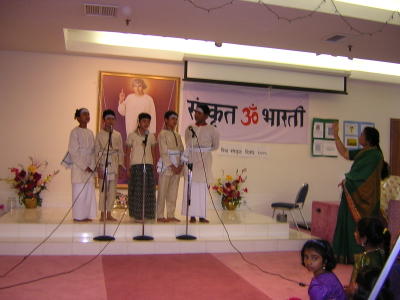World Sanskrit Day - Sep 17 2005
I've been learning spoken Samskritam (Sanskrit) for a year now. As you might know, Samskritam is one of the most ancient languages in the world and is considered to be root of Indo-European languages. It was widely spoken many centuries ago in India and adjoining modern countries but it slowly became a language found only in texts and scriptures.
Samskrita Bharati is a non-profit organisation whose aim is to bring back the usage of Samskritam in daily life. Raju mahodayaH (pronounced as raaju mahodayaha which means Mr.Raju in Samskritam) is the volunteer from Samskrita Bharati who teaches us spoken Samskritam. Under his guidance, a bunch of us (about 10) are learning to speak Samskritam. We have classes of 1 hour duration,once a week. We learn this language the same way a toddler learns to speak its mother-tongue. Listening -> Speaking -> Reading -> Writing. We'll learn grammar when we are comfortable enough with the speaking bit.
Every year , the purnima day of Sravana month (full moon day of Sravana month in the Hindu calendar) is celebrated as the Vishwa Samskrita Dinam (World Sanskrit Day). This year it was on Sep 17 , Saturday. The celebration for the Boston Metro area was held at Sadhu Vaswani Center, Dracut ,MA. Many other batches of different age groups and levels of comfort in Samskritam had come with their preparations.

This is the first VSD our batch celebrated. We practiced 2 skits and one group song for the celebration - all in Samskritam. One was a contemporary skit - an one act play with just 2 characters. An actress was interviewed in a TV show. The other skit is an adaptation of Panchatantra story - Dharmabudhi & Papabudhi (meaning Virtuous & Vicious). It was so much fun practicing them and staging them. 

The programs were scheduled betweeen 4.30 pm- 7 pm. It was really refreshing to hear everyone speaking to each other in Samskritam the whole evening. We realised that, even though we dont speak it any more in India, all our languages are derived from it so it is in our blood to understand the language. All we need, is for someone to, wake those Samskritam cells in us and bring them alive.
The songs were so much full of passion for the Indian culture. So much about ancient India is hidden in the Samskritam texts - literary, scientific and religious. We need to learn and know Samskritam to fully understand our heritage, our roots, then and only then will we be able to be proud of our identity and appreciate it.
jayatu samskritam, jayatu manukulam (long live samskritam, long live mankind)

3 comments:
I didn't know much of what you write of. I thought that Sanskrit was commonly spoken.
It is wonderful to preserve and nurture the world's heritage.
I bid you peace.
jaya jaya jaya priya bharata janayatri divya dhatri
greatly appreciate your dedication and spirit
Great to see these pics on your blog! --Lava.
Post a Comment